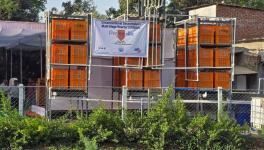US Top Court Backs Gujarati Fishermen, Allows Them to Sue World Bank’s IFC

Image Coutesy: Livemint
In a historic victory for Gujarati fishermen, the U.S. Supreme Court has allowed them to sue the International Finance Corporation (IFC), a private lending arm of the World Bank in the U.S. courts.
The Court’s judgement on February 27 in the JAM vs IFC case, paves way for lawsuits against international organisations involved in “commercial activities”, which have been enjoying “absolute immunity from suits”.
In 2008, the IFC had loaned $450 million for the construction of Tata Power’s Mundra power plant in 2008. While the IFC was granted supervisory authority (as per its loan agreement) over the project including implementation of an Environmental and Social Action plan, the local fishing communities and project-affected villagers have been claiming that the IFC failed on various lines, resulting in massive environmental damage in the area surrounding the project.
Machimar Adhikar Sangharsh Sangathan (MASS), the Earth Rights International and the Stanford Law School Supreme Court Litigation Clinic are among the petitioners in this lawsuit.
The petitioners have welcomed the judgement. One petitioner, Dr Bharat Patel, General Secretary, MASS, said, “This is a huge victory for the people of Mundra in particular and other places in general, where World Bank’s faulty investments are wrecking communities and the environment. This is a major step towards holding World Bank accountable for the negative impacts their investments are causing.”
MASS had first raised concerns against the Mundra plant in 2011. In their complaint to the compliance mechanism of the IFC, MASS demanded an independent investigation into the violations of the IFC, alongside raising various issues such as the project’s flawed development goal, design, implementation and the risks it poses to local people, community, livelihood and ecology.
Also Read: World Bank Facing Legal Action for Destroying Fishermen’s Livelihoods in Gujarat
Since then, the Gujarati fishermen had taken their fight against the IFC to several courts in the U.S., but tasted defeat as the courts ruled in favour of the IFC as enjoying “immunity from suits” under the country’s International Organisations Immunities Act (IOIA), 1945.
However, the U.S. Supreme Court reversed the previous orders based on the “restrictive” theory implied in the country’s Foreign Sovereign Immunities Act, codified in 1952. “Under that theory, foreign governments are entitled to immunity only with respect to their sovereign acts, not with respect to commercial acts,” reads the judgement.
Furthermore, the Supreme Court noted that the IFC’s internal audit found “violation of terms of the loan agreement laid down by the IFC which allowed for revocation of financial support if there was a breach by coastal Gujarat.” The court also noted that the IFC’s own charter does not state that the organisation is “absolutely immune from suits.”
Get the latest reports & analysis with people's perspective on Protests, movements & deep analytical videos, discussions of the current affairs in your Telegram app. Subscribe to NewsClick's Telegram channel & get Real-Time updates on stories, as they get published on our website.
























